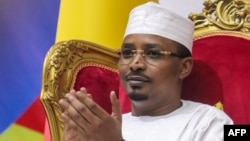Chadian leader Mahamat Idriss Deby Itno's plans to stay in power beyond his initially-promised deadline have stirred anger at home and embarrassment for his backers abroad.
The 38-year-old five-star general took the helm in April 2021 after his father, Idriss Deby Itno, Chad's iron-fisted ruler for three decades, was killed during an operation against rebels.
The junta had originally declared it would restore civilian rule after 18 months in power, and Deby had at first promised he would not take part in the future elections.
It was partly on the strength of these commitments — but also on Chad's status as an ally fighting jihadism — that Deby was endorsed by the African Union (AU), European Union (EU) and former colonial power France.
But as the 18-month deadline neared, a nationwide forum staged by Deby chose to reset the clock.
Last weekend it approved a new 24-month timeframe for holding elections, named Deby "transitional president" for the interim and declared he could be a candidate in the poll.
The forum was "tailor-made... to legitimize the monarchical handover of power from father to son," an umbrella group of political figures and groups, including the opposition coalition Wakit Tamma, said in a statement.
It called for "civil disobedience" and "peaceful demonstrations" on October 20.
Among the armed rebels who are a persistent thorn in the government's side, a statement signed by 18 groups warned the regime would be held responsible "for all the consequences arising from its deception."
One of the signatories is the powerful Front for Change and Concord in Chad (FACT), which triggered the offensive in the northeast last year that ended in the elder Deby's death.
Vexation abroad
A semi-desert country located in the heart of central western Africa, Chad has been chronically unstable since it gained independence from France in 1960.
Foreign displeasure at Deby's push for power was visible at the ceremonies on Monday when he was sworn in as interim president.
The AU snubbed the event, while France and the EU were notably represented only by their ambassadors.
Just three weeks earlier, the AU had appealed to the junta not to extend its stay in power beyond 18 months and "unequivocally" warned against any of its members taking part in the future elections.
With the exception of Nigerian President Muhammadu Buhari, no other African countries sent their heads of state. A handful of important neighbors — Niger, the Central African Republic and Democratic Republic of Congo — were represented by their ministers.
The AU and the West African bloc ECOWAS have been fierce critics of the string of coups that have swept the region in the past two years, with takeovers in Guinea, Burkina Faso and Mali as well as Chad.
Pragmatism
Enrica Picco of the International Crisis Group (ICG) think tank said the junta had been formally dissolved as a result of the forum, which meant Deby's powers would be "widened and extended" as transitional president.
He is expected to name a new prime minister and "government of national union" in the next few days. His old premier, political veteran Albert Pahimi Padacke, who had served for 18 months, formally resigned on Tuesday along with his government.
Picco said the choice of the incoming government presented an opportunity for Deby, giving him the chance of building bridges in his divided country.
On the other hand, if the government is "totally closed off to the parties, armed groups and civil society who did not take part in the dialogue, everything is possible — protests, or armed groups taking up their weapons again resuming attacks," she said.
Roland Marchal, an Africa specialist at the Sciences Po school in Paris, said the international community had been embarrassed by Deby, but — in contrast with other coups in the region — would probably not support sanctions against him.
"Pragmatism will prevail and we'll see a return to support for the regime along the lines that have existed since 1990," when the elder Deby took the reins, he predicted.
Chad Ruler Raises Hackles with Drawn-Out 'Transition'

LIBREVILLE —